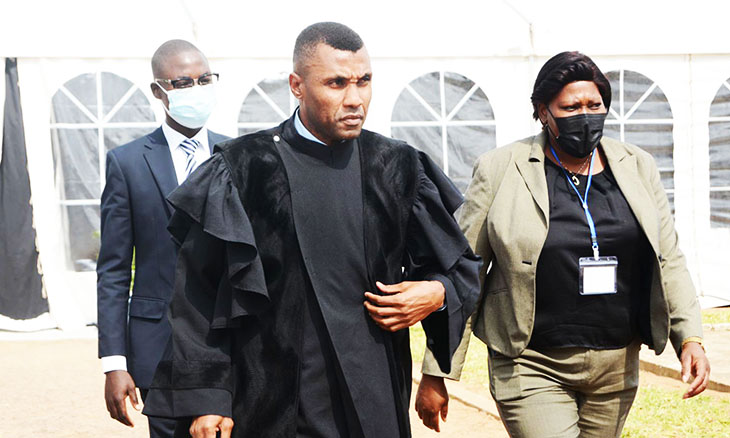Mozambique: FADM military personnel practice Tactical Combat Casualty Care skills
‘Hidden debts’: Trial will be held based on the 1929 Criminal Procedure Code – O País report

Photo: O País
Notwithstanding the review carried out in 2019, the ‘hidden debts’ case will be conducted on the basis of the Criminal Procedure Code of 1929, by decision of the judge in the case, Efigénio Baptista.
The judge presiding the trial of case 18/2019-C, known as the ‘hidden debts’ case, argues that the stages of denunciation, investigation and indictment were regulated by the Criminal Procedure Code of 1929.
The new Criminal Procedure Code was approved in December 2019
Among several changes, the new Criminal Procedure Code changes the designation of defendants (réus) and declarants (declarantes) to “arguidos” and “testemunhas” (defendants and witnesses).
Furthermore, terms of preventive detention are extended in the new code, which would have justified the maintenance of the defendants detained in this process for an even longer period of time.
However, during the discussion of preliminary issues on the first day of the trial, the defence, notably Alexandre Chivale, who represents four of the 19 defendants in the case, requested that the constituents be treated as “arguidos”, as provided for in the 2019 Code of Criminal Procedure, and that the deponents be treated as witnesses.
A foreshadowing of the answer was already coming from the representative of the Public Prosecutor, Ana Sheila Marrengule.
“Once the form of the process to be followed is defined, these issues will be resolved, not least because we have a list of 58 deponents heard in this capacity under the 1929 Code of Criminal Procedure. We have Article 9 [of the 2019 revised code], which establishes the validity of the acts performed under the previous law,” she remarked.
The judge of the case, in turn, clarified the legal basis to be used for conducting the process.
“The court understands that, should the new law be immediately applied, the question would be raised as to the deadline for filing an appeal.”
Judge Efigénio Baptista’s other argument is that the procedural stages of denunciation, instruction and indictment ( denuncia, instrução e acusação) had been held under and regulated by the old law.
“The form of the process is that of a dispute [querela], and this is the form that must be followed until the end, that is, until the decision becomes final, according to the provisions of paragraph 2 of article 3 of the new Code of Criminal Procedure,” he explained.
The question is then about the legal coverage of preventive detention, taking into account that, based on the 1929 Code of Criminal Procedure, the deadlines were extrapolated. In fact, the defence insisted in Monday’s session that all detainees must respond in freedom.
However, judge Efigénio Baptista understands that this stage [of the process] is not he place for the defence to require the freedom of its constituents, so the previous decision is upheld.
The court also said that it decides to maintain the coercive measures applied to the defendants on the grounds that the assumptions that initially determined them were still met.
In view of the decisions, the defendants will continue to be treated as ‘réus’, and the witnesses as ‘declarantes’ and those in pre-trial detention will stay in pre-trial detention,
By José João
Julgamento do caso das dívidas ocultas conduzido com base no CP Penal de 1929
Não obstante a revisão havida em 2019, o processo sobre dívidas ocultas é e será conduzido, até ao fim, com base no Código do Processo Penal de 1929, segundo ditou a decisão do juiz Efigénio Baptista.
O juiz que julga o processo 18/2019-C, conhecido como caso das dívidas ocultas, argumenta que as fases da denúncia, da instrução e da pronúncia foram reguladas pelo Código do Processo Penal de 1929.
EM DEZEMBRO DE 2019, NOVO CÓDIGO DO PROCESSO PENAL FOI APROVADO
Entre várias mexidas, o instrumento altera a designação dos réus e dos declarantes, passando a ser arguidos e testemunhas. E mais, os prazos de prisão preventiva são estendidos, o que até teria justificado a manutenção por mais tempo dos arguidos detidos neste processo.
Entretanto, durante a discussão de questões prévias no primeiro dia das audições do julgamento, a defesa, com destaque para Alexandre Chivale, que defende quatro dos 19 réus no caso, exigiu que os constituintes fossem tratados como arguidos, tal como prevê o Código do Processo Penal de 2019 e que os declarantes fossem tratados como testemunhas.
O prenunciar da resposta já vinha da representante do Ministério Público, Ana Sheila Marrengule.
“Uma vez definida qual a forma do processo a ser seguida, estas questões serão sanadas, até porque temos um rol de 58 declarantes ouvidos nessa qualidade na vigência do Código do Processo Penal de 1929. Temos o artigo 9 (do Código do Processo Penal revisto em 2019) que estabelece a validade dos actos realizados na vigência da lei anterior”, explica.
O juiz da causa, por sua vez, tratou de clarificar qual a base legal a ser usada para a condução do processo.
“Entende o Tribunal que, ao aplicar-se imediatamente a nova, lei levantar-se-ia a questão de saber o prazo para se interpor recurso.”
O outro argumento de Baptista é que as fases da denúncia, da instrução e da pronúncia foram regulados pela antiga lei, ou seja, pelo Código de Processo Penal de 1929.
“A forma de processo é a de querela e é esta a forma que deve ser seguida até ao final, isto é, até ao trânsito em julgado da decisão, ao abrigo do disposto no nr.2 do artigo 3 do novo Código de Processo Penal”.
Fica então a questão sobre a cobertura legal da prisão preventiva, tendo em conta que, com base no Código do Processo Penal de 1929, os prazos foram extrapolados. Aliás, a defesa insistiu na sessão desta segunda-feira que todos os detidos deviam responder em liberdade.
Entretanto, Efigénio Baptista entende que esta não é a fase para a defesa requer a liberdade dos seus constituintes, pelo que se mantém a decisão anterior.
O Tribunal diz também que decide manter medidas de coação aplicadas aos réus com o fundamento de que se verificam os pressupostos que determinaram o seu decretamento.
Face às decisões, os réus, além de responder ao processo sob medida de prisão preventiva, continuarão a ser tratados como réus e os declarantes também como tal.












Leave a Reply
Be the First to Comment!
You must be logged in to post a comment.
You must be logged in to post a comment.